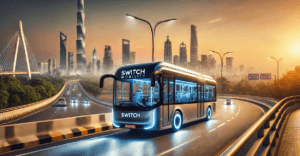Ashok Leyland’s Switch Mobility Set for 3X Growth & Profit in FY26 | Big EV Breakthrough
Ashok Leyland’s EV subsidiary, Switch Mobility, is on track to achieve net profitability in India by FY26, with plans to triple its bus sales. In FY25, the company expects revenue between ₹900-1,000 crore, with around 450 electric buses sold. According to MD & CEO Shenu Agarwal, the Indian arm is already EBITDA positive and aims to reach net profit within four to six quarters through cost controls and operational synergies. While the company has manufacturing bases in India and the UK, it is considering shutting down its Sherburn facility in the UK due to slow EV adoption.
In India, Switch Mobility offers the EiV 12 and EiV 22 double-decker buses and is developing a new low-floor city bus. The LCV segment includes the IeV4 and IeV3 models, with total LCV sales expected to exceed 1,000 units this year. A strong order book of 1,300 buses is expected to drive threefold growth next year. Meanwhile, the UK division faces challenges, with projected losses of £20-25 million in FY25 and a net debt of £80 million due by FY29.

Ashok Leyland’s Switch Mobility Set for 3X Growth & Profit in FY26 | Big EV Breakthrough
Ashok Leyland, a leading name in India’s commercial vehicle sector, has set ambitious goals for its electric vehicle (EV) subsidiary, Switch Mobility. The company expects Switch Mobility’s India operations to achieve net profitability for the first time by the financial year 2026 (FY26), driven by cost optimization and rising demand for electric buses. Additionally, the firm aims to triple its electric bus sales in the coming years, signaling a strong push to capture a larger share of India’s growing EV market.
Current Financial Performance and Near-Term Goals
In the current financial year (FY25), Switch Mobility India is projected to generate revenues between ₹900 and ₹1,000 crore, with electric bus sales expected to reach approximately 450 units. The company has already achieved profitability at the operating level (EBITDA), according to Shenu Agarwal, Managing Director & CEO of Ashok Leyland. To transition to net profitability within the next four to six quarters, Switch Mobility plans to implement stricter cost controls and leverage synergies with its parent company, such as shared manufacturing infrastructure and supply chain efficiencies.
On the light commercial vehicle (LCV) front, Switch Mobility’s electric models—the IeV4 and IeV3—are gaining traction. The company anticipates selling over 1,000 units of these LCVs in FY25, complementing its electric bus business. With a robust order pipeline of 1,300 buses, Switch Mobility is confident about tripling its bus sales in the next fiscal year, capitalizing on India’s accelerating shift toward sustainable mobility.
Product Portfolio and Market Strategy
Switch Mobility has introduced two electric bus models in India: the EiV 12 and the EiV 22 double-decker. A new low-floor city bus, built on a dedicated platform, is also under development. These vehicles cater to both intra-city and inter-city transportation needs, aligning with government initiatives to electrify public transit.
To streamline operations, the company will focus exclusively on direct sales in India, moving away from the Gross Cost Contract (GCC) model. This shift allows Switch Mobility to retain greater control over pricing and customer relationships while reducing dependency on third-party operators. The strategy reflects the company’s confidence in rising demand from state transport agencies, private fleet operators, and corporations aiming to meet sustainability targets.
Growth Drivers in India’s EV Market
India’s electric bus market is poised for rapid expansion, driven by federal and state-level incentives, stricter emission norms, and increasing cost parity between electric and diesel vehicles. Government tenders for electric buses, such as those under the FAME II scheme, have already created a significant demand pipeline. Private sector adoption is also rising, with companies investing in electric fleets to reduce their carbon footprint.
Ashok Leyland’s CFO, KM Balaji, emphasized that Switch Mobility’s growth will be fueled by this dual demand from public and private buyers. The company’s ability to deliver customized solutions—such as buses tailored for urban routes, highways, or tourist circuits—positions it as a versatile player in the market.
Challenges in the UK and Strategic Adjustments
While the Indian operations show promise, Switch Mobility’s UK division faces headwinds. Slower-than-expected adoption of EVs in the UK’s public transport sector has led to financial strain, with the division projected to report a loss of £20–25 million in FY25. Additionally, the UK arm carries a net debt of approximately £80 million, repayable by FY29.
In response, the company is considering shutting down its Sherburn-based manufacturing facility. This move would allow Switch Mobility to redirect resources toward markets with higher growth potential, such as India and other regions with supportive EV policies. The UK team will continue focusing on R&D and technology development, ensuring global innovations benefit operations worldwide.
Road Ahead
Ashok Leyland’s aggressive investment in Switch Mobility underscores its commitment to leading India’s electric mobility transition. By prioritizing cost efficiency, product innovation, and strategic market focus, the subsidiary aims to carve out a sustainable niche in the competitive EV landscape.
The next two years will be critical as Switch Mobility works to convert its order backlog into tangible sales, scale up production, and achieve profitability. Success in India could also pave the way for global expansion, leveraging lessons learned from domestic operations. However, challenges such as supply chain bottlenecks, evolving regulations, and competition from established EV manufacturers will require careful navigation.
In summary, Switch Mobility’s journey reflects both the opportunities and complexities of the EV sector. With a clear roadmap for growth and a focus on execution, Ashok Leyland’s electric subsidiary is betting big on India’s green mobility future.
You must be logged in to post a comment.